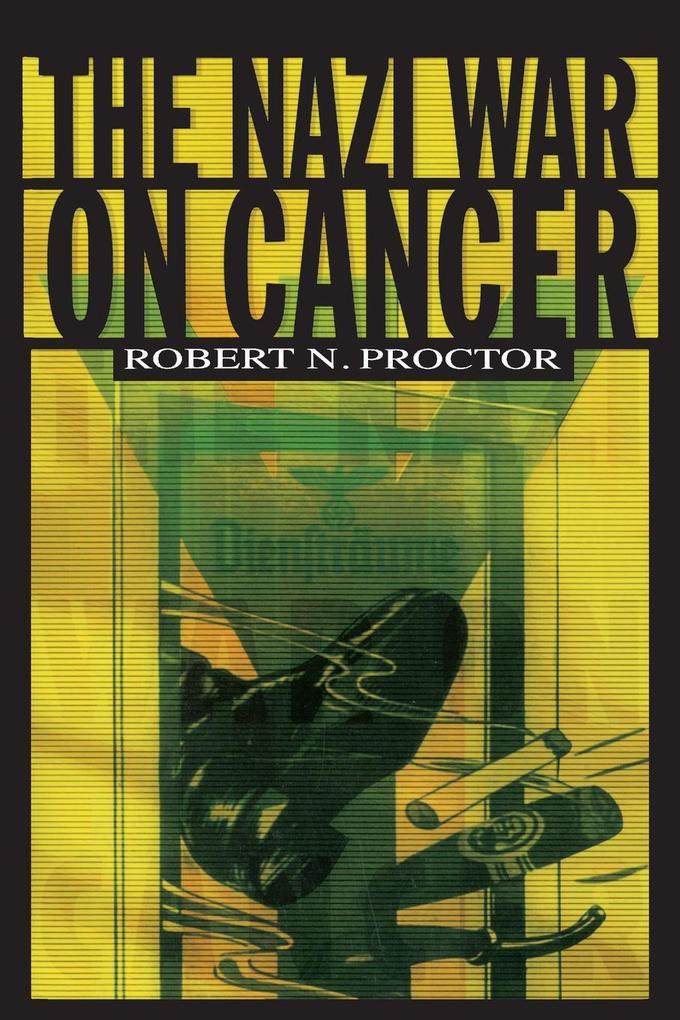Winner of the 1999 Arthur Viseltear Prize for the History of Public Health in America, Medical Care Section of the American Public Health Association "The Nazi war on cancer? Other readers may be as incredulous as I was when this book came to my attention. We think of Hitler's regime as waging war on nations and peoples, not on behalf of public health. But good historical work surprises us by recovering forgotten facets of the past. Robert N. Proctor, a veteran historian of science who teaches at Pennsylvania State University, has produced a book full of surprises."--Michael Sherry, New York Times Book Review "The Nazi War on Cancer is a provocative and powerful book. It presents a great deal of research in an accessible, even breezy style and makes important contributions both to the history of medicine and to our understanding of fascism's many dimensions."--Paul Lerner, The Times Higher Education Supplement "[A] fascinating book ... Proctor's account is outstanding ... A generation ago, Hannah Arendt increased the world's understanding of Nazi behavior (and caused a lot of controversy) by talking about the 'banality of evil.' Robert N. Proctor has now brought us a concept nearly as unsettling, the 'banality of good.'"--David Brown, Washington Post Book World "Well documented and highly readable... This is an important book which will encourage the reader to reflect on the ways in which medical science was conducted and used in the twentieth century."--Nature "In his forthcoming book, Robert B. Proctor suggests that Nazi researchers were the first to recognize the connection between cancer and cigarettes. The prevailing view was that British and American scientists established the lung-cancer link during the early 1950's. In fact says Proctor, 'the Nazis conducted world-class studies in the field.' But their findings, because of the abhorrent medical practices used by the regime, were ignored. Hitler, a teetotaling vegetarian, believed healthy living advanced the master race; Jews, Gypsies and smokers soiled the purity of the nation."--David Spitz, Time Magazine "[An] arresting and important exploration... The value of [this] unblinking book lies in its revelations about why the Nazis were absorbed with the problem of cancer, what they learned about the sources of the disease, and the actions they took to prevent it."--Daniel J. Kevles, The New York Review of Books "Proctor's provocative book is highly recommended..."--Library Journal (starred review) "A fascinating look at German contributions to the study of cancer... Proctor's account is well-researched and richly illustrated, and he delineates carefully documented facts in fluid prose... [A]n important, instructive book..."--Kirkus Reviews "[An] illuminating analysis of the interaction between science and national neurosis... Proctor provides ample documentation of his claim... Proctor has produced a much-needed corrective to our understanding of the Third Reich+s medical culture..."--Sherwin B. Nuland, The New Republic "Proctor describes the Nazi-era programs and scientific work with tobacco, alcohol, and industrial chemicals in detail, enlivening his account with anecdotes and a smooth sense of humor... Fascinating stuff."--Booklist "[Proctor] succeeds admirably, giving readers a thoroughly researched account of Nazi medical science and posing difficult questions about the ultimate worth of good research carried out under the auspices of evil."--Publishers Weekly "A fascinating, thoughtful, and beautifully illustrated tome."--Choice "A fascinating, substantial study of cancer and lifestyle in Nazi Germany... Proctor's examples are vivid and his analysis incisive; precisely because of the congenial mix of the specific and the abstract, The Nazi War on Cancer stands out as a major contribution to the study of fascism and will undoubtedly--and deservedly--become a standard item, on reading lists in 20th-century history."--Peter Fritzsche, American Scientist "A readable and well-referenced book that appears to be a work of public health history but is really much more."--Journal of the American Medical Association "A readable and well-referenced book... Much of what the book reveals may well prove disturbing to many readers... All who consider themselves participants in the contemporary war on cancer had best read this book..."--Journal of the the American Medical Association "A remarkable study... Without in any way minimizing or relativizing the evils of medical euthanasia or genocide, Proctor shows that the Nazi obsession with nurturing a healthy Aryan people led to serious scientific work in public health that can only be called progressive in its implications."--Martin Jay, London Review of Books "Proctor has produced an absorbing and rewarding study of a grim yet important episode in scientific history. His intellectual grip on the subject never slackens, and his well-crafted prose, almost entirely free of academic jargon, will delight a wide readership."--Ralph Amelan, The Jerusalem Post "In this pathbreaking and courageous study, Robert N. Proctor not only tells a fascinating story but also makes an important historiographical critique... Proctor challenges readers to contemplate what it means for fanaticism, crime, and callousness to have coexisted with common sense and rigorous scientific inquiry."--Bronwyn McFarland-Icke, Medical History










